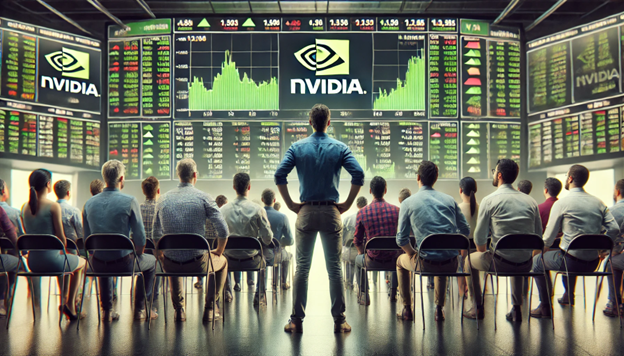Nvidia, the chip-making giant, is no stranger to volatility, but even by its own standards, the recent market reaction was extreme. On August 29, 2024, Nvidia reported a staggering 122% increase in revenue, far surpassing Wall Street expectations. However, this impressive financial performance was met with a sharp decline in the company’s stock, which plunged as much as 10% in after-hours trading. Although the stock managed to pare back some of the losses, settling at a 5% drop before the market opened on Thursday, the market’s reaction was a clear signal that investors were left unsatisfied.
The Financials: A Glimpse into Nvidia’s Stellar Performance
Nvidia’s financial report for the quarter was nothing short of spectacular. The company posted revenue of $30 billion, a 122% increase from the same period last year, and well above the $28.7 billion that analysts had predicted. Earnings per share (EPS) also exceeded expectations, coming in at 68 cents, a 152% jump from the previous year and above the 65 cents anticipated by analysts. Net profit soared to $16.95 billion, cementing Nvidia’s position as a dominant force in the semiconductor industry.
Despite these eye-popping figures, the stock market’s reaction was less than enthusiastic. The reason for this seemingly paradoxical response lies in the expectations game that often governs investor sentiment. While Nvidia’s performance was impressive, many investors had hoped for an even bigger beat on the top and bottom lines. The fact that Nvidia’s results, although stellar, did not blow past expectations left some investors disappointed, leading to the sharp sell-off.

The primary reason for the sharp drop in Nvidia’s stock, however, was not just about the earnings numbers but also about the future outlook provided by the company. During the earnings call, Nvidia’s CEO, Jensen Huang, provided guidance that some investors found underwhelming. The company forecasted revenue of $32.5 billion for the next quarter, which was only slightly above the $31.7 billion that analysts had expected. While this guidance is still robust, it was not the blowout number that overly optimistic investors were hoping for.
Adding to the unease was the announcement that the much-anticipated Blackwell GPU, Nvidia’s next-generation chip, would be delayed. Huang mentioned that the company expects to generate “several billion dollars” from Blackwell chip sales this fiscal year, but the lack of a more specific timeline or revenue projection left investors wanting more. This lack of clarity around a key product launch created uncertainty, contributing to the sell-off.
The Market’s Reaction: A Tale of High Expectations
The sharp decline in Nvidia’s stock highlights the high expectations that investors have for the company, particularly in the context of its dominance in the AI and semiconductor sectors. Nvidia has been riding high on the AI boom, with its chips being integral to powering everything from data centers to AI-driven applications. This has led to Nvidia achieving a market capitalization of $3 trillion, making it one of the most valuable companies in the world.
However, with such a lofty valuation comes intense scrutiny and high expectations. Investors are not just looking for Nvidia to meet expectations; they want it to consistently exceed them by a wide margin. In this case, while Nvidia delivered strong results, they were not strong enough to justify the sky-high expectations that had been built into the stock’s price.
Conclusion: A Reminder of Nvidia’s Volatility
Nvidia’s recent earnings report and the subsequent market reaction serve as a reminder of the volatility that can come with being a high-flying tech giant. Despite delivering a 122% increase in revenue and a 152% jump in earnings per share, the company’s stock still took a significant hit due to investor concerns about future growth and product delays.
For long-term investors, this episode may be a blip in the road, particularly if Nvidia continues to dominate the AI and semiconductor markets. However, it also underscores the risks associated with holding stocks in companies where expectations are sky-high, and even the slightest hint of underperformance can lead to dramatic swings in stock price. As Nvidia continues to navigate the rapidly evolving tech landscape, investors will be watching closely to see if the company can once again exceed expectations and restore confidence in its stock.












